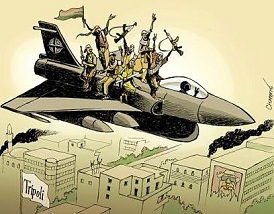Pat Buchanan’s Suicide of a Superpower: The Suicide of Liberty
Buchanan is concerned that America might not survive until 2025. Instead, shouldn’t we be concerned that the American police state could last that long? Shouldn’t we be worried that the police state will survive yet another presidential election, or even one more day?
Pat Buchanan’s latest book, Suicide of a Superpower, raises the question whether America will survive to 2025. The question might strike some readers as unduly pessimistic and others as optimistic. It is unclear whether the US, as we have known it, will survive its next presidential election.
Consider the candidates. Liberal law professor Jonathan Turley, who was likely to have been an early Obama supporter, now wonders if Obama is “the most disastrous president in our history.” Despite Obama’s failure, the Republicans can’t come up with anyone any better. One Republican candidate admires Alan Greenspan, the Federal Reserve chairman who gave us financial deregulation and the financial crisis. Another is ready for a preemptive strike on Iran. Yet another thinks the Soviet Union is a grave threat to the United States. None of these clueless dopes are capable of presiding over a government.
Anyone who has been paying attention knows that the “superpower” is over-extended financially and militarily. The US is currently involved in six conflicts with Syria, Lebanon, Iran, and Pakistan on the waiting list for full fledged military attacks and perhaps invasions. Russia is being encircled with missile bases, and war plans are being drawn up for China.
Where is the money going to come from when the country’s debt is bursting at the seams, the economy is in decline, and unemployment on the rise?
Washington thinks that the money can simply be printed. However, enough has already been printed that the rest of the world is already suspicious of the dollar and its role as reserve currency.
As John Williams has said, the world could begin dumping dollar assets at any time. I don’t think we can dismiss Buchanan’s concern as pessimistic.




























